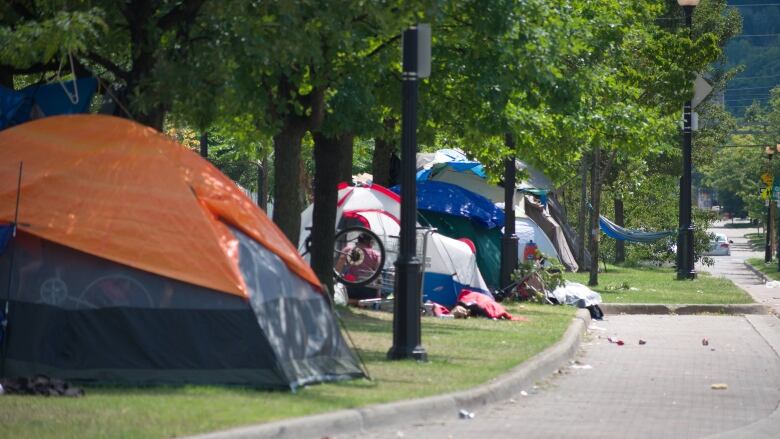Would an injunction against tent teardowns wade too far into city policymaking, a Hamilton court asks?
Judge said he has 'trepidation' about telling elected officials how to create a law

Would an injunction barring Hamilton from evicting people living in encampments effectively tie the city's hands and cause a judge to wade into the area of policy-making?
That question was the topic of discussion Thursday as lawyers for the city and those representing five homeless residents fighting for the right to sleep in public areas met in a Superior Court.
The Hamilton Community Legal Clinic (HCLC) is seeking an injunction that would largely prevent the city from tearing down encampments around the city. The city wants to keep enforcing its bylaw prohibiting tents in public areas.
HCLC lawyer Stephanie Cox said it wants groupings of up to six tents to be allowed in parks, so long as they're 50 metres away from playgrounds, schools or child care centres and at least 200 metres from each other.
Justice Andrew Goodman said while the Superior Court has wide discretion, courts generally interpret or enforce laws, not make them.
"I have some trepidation with respect to this court telling an elected body on how to create a law or amend the law," he said.
Cox responded that the HCLC wasn't asking the judge to decide which specific parks could host encampments but rather to set up parameters around where enforcement could take place and recognize the harms that come with it.
"We are not seeking a sweeping order that would tie the city's hands," she said. Instead they're looking for the judge to limit the "sweeping nature" of the encampment bylaw.
Injunction would 'undermine' the system: City lawyer
Lawyer Michael Bordin from Gowlings WLG, who is representing the city, argued that entrenching encampments could create a "secondary shelter system" and encourage people to stay in tents rather than shelters.
He said an injunction blocking the city from enforcing its bylaw would "undermine" the system meant to provide temporary shelter and eventually housing.
Bordin also cautioned the court against a ruling that would in effect prioritize housing for only those in encampments and allow them to stay there indefinitely until it was provided.
"It's going to encourage folks into encampments … instead of what the city's trying to do, which is get them out," he said.
"Creating a secondary, or even a quasi-permanent encampment-shelter system draws money away from shelters and addressing the underlying issues of homelessness."
ATTN <a href="https://twitter.com/hashtag/Hamont?src=hash&ref_src=twsrc%5Etfw">#Hamont</a>:<br><br>We have received calls requesting clarification of the Order the homeless Applicants are seeking in the injunction. We wish to clarify that they are not seeking a complete prohibition of the enforcement of the bylaw that evicts encampment residents.<br><br>1/3
—@HamiltonJusticeThe HCLC lawyers said even if enforcement was limited, nothing in the injunction would stop the city from creating more shelter space and engaging with encampment residents to help them access supports.
Neighbour discomforts 'pale' to encampment realities
Court heard evidence from some residents living near encampments that mentioned increased anxiety, trouble sleeping and concerns about drug use, garbage and violence.
Those accounts reflected statements shared by people with homes around encampments during the city's planning committee meeting on Tuesday.
Ward 2 Coun. Jason Farr, who has said the issues cause by encampments are getting worse, released a statement following the meeting which mentioned "public displays of drug use, nudity, sex, assaults and defecation."
The councillor added there are "safer and more human" options than living in a tent.
But Cox said the discomfort of those residents "pale in severity and desperation" to the consequences those in encampments face if they can't find shelter of are routinely evicted.
"Taking away tents is not going to reduce or eliminate homelessness," added her co-counsel, Sharon Crowe. "The only thing it will achieve is to make an already vulnerable group even more vulnerable."
The legal clinic team has also filed a constitutional question with the Attorneys General for Ontario and Canada on the issue of encampment evictions on Oct. 4.
Ruling will come as soon as 'reasonably possible'
Bordin ended his arguments on Thursday saying the injunction being sought is broader than anything that was in place previously, including a city protocol that allowed some encampments for up to 14 days provided they met certain criteria.
He posed a hypothetical, saying the injunction would allow every single homeless person in the city to set up an encampment, regardless of whether there's shelter space available for them.
Goodman reserved his judgment and said he'll aim to share his ruling and reasons for it "as soon as reasonably possible."
In the meantime, the city is prohibited from evicting people from existing encampments that meet the limits proposed by the legal clinic.